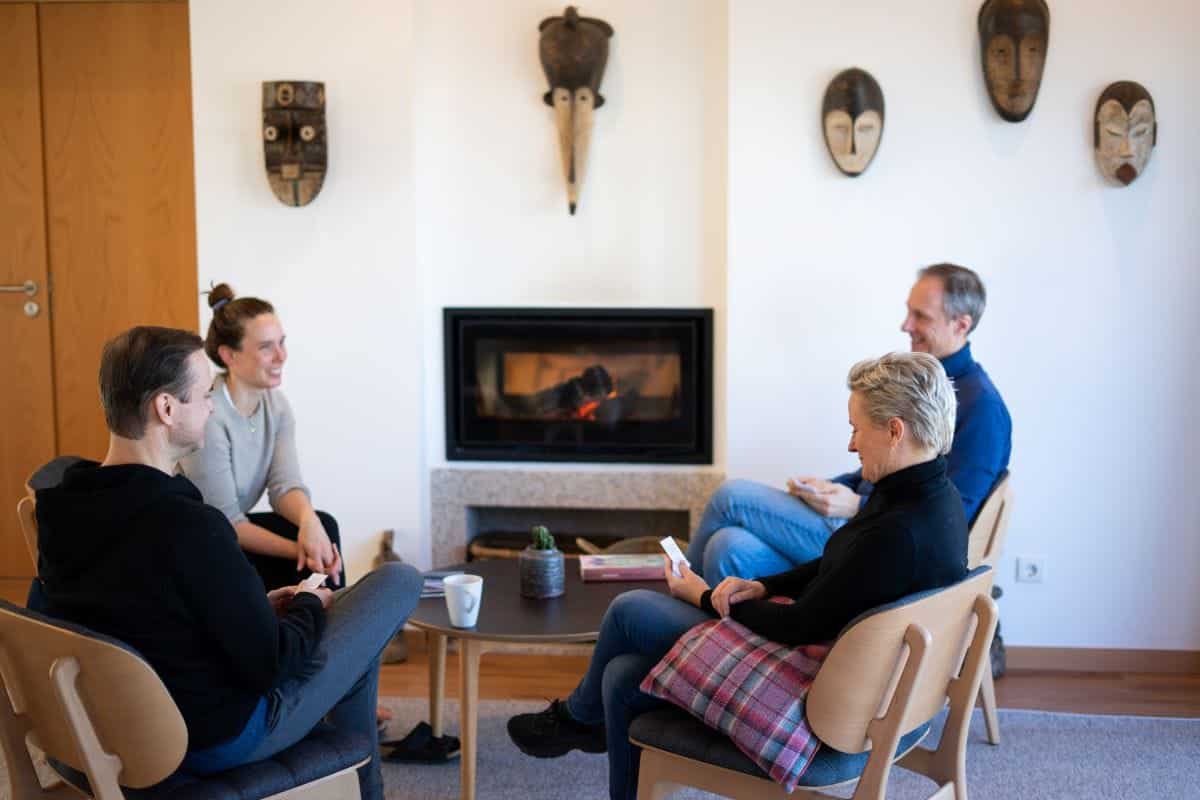The healing power of community. All of us have felt it, even though we may not quite know what we feel. There is the creeping realization that even though the latest viral variant may have run its course, life as we knew it is not returning.
The delayed sense of loss and grief made all the more complicated by the absence of community rituals that ground and surround us. The aversive sense of a new normal that doesn’t feel normal at all. Relationships that went from faltering to failed, and a loneliness so pervasive it seems beyond mending. A pain beneath our pain that shames us for feeling so bad when we know others have suffered much more, for much longer.
This is the felt sense of late-pandemic life, its residue. Many mental health providers, the so-called ‘last responders,’ fear a coming second wave, the global tsunami of emotional and relational loss, as much as if not more than the first, physical plague.
The British medical journal Lancet calls the experience “population shock,” a seismic shift so big and broad that it can only be compared to such massive realignments as the Great Depression and the Second World War.
In the face of such a threat, to speak of what one small, new community has to offer may seem naïve, and perhaps it is. Opened at the end of 2021, New Life Portugal is new. We are still learning what the needs of our guests are and how best to meet them.
But New Life also has 10 years of history in Thailand, testing the principles of mindfulness-based, intentional community living. With humility and curiosity, we offer what we know.
The Problem
How should we quantify this present moment from a mental health perspective? As we move into the third year of this pandemic, the long-term effects of covid life are beginning to emerge, and it is a complex diagnostic picture. The list of symptoms continues to grow in all domains of physical, emotional, and social existence.
The term ‘long-haul covid’ has come to signify a staggering array of symptoms suffered by patients long after the virus is done; what will be the equivalent jargon for post-pandemic mental health syndrome?

The healing power of community
Even before the pandemic, global levels of anxiety and depression (and mental disorders overall) had been identified as a major and growing health burden worldwide. The covid-specific numbers are staggering: Surveying 204 countries and territories for the mental health impact of covid, the British medical journal Lancet found an additional 53.2 million cases of major depressive disorder worldwide, for an increase of 27.6% and 76.2 million new cases of anxiety (a 25.6% increase) —and that was in 2020.
There was early and entirely predictable evidence that long-haulers are particularly vulnerable to higher rates of depression and anxiety. Now, as researchers turn their attention to the population at large, it is becoming evident that some of the ‘solutions’ to the covid crisis, such as social distancing and restricted travel, have exacerbated the mental health burden of loneliness and isolation.
In the first two months at New Life, our counselors saw more cases of burnout and pandemic exhaustion than they had in two and a half years of private practice in various locations around the globe. Our intakes reflect concerns expressed in the press: we see burnout, depression, anxiety, insomnia or other sleep disturbance, panic disorder, and complicated grief. The healing power of community is real.
Our guests come in with all the signs of a depleted autonomic nervous system. They are exhausted in body, mind and spirit; numb or agitated or a mix of both; unable to maintain their work lives or family relationships; despondent and hopeless, their bodies stuck in a kind of chronic fight/flight/freeze response to the trauma of everyday life in a late-pandemic world.
In his book Tribe, Sebastian Junger tells many stories of the power of community in the face of collective trauma, and he argues that humans are hardwired to be helpers and to function in community. But the pandemic is different. The healing power of the community cannot be accessed by isolated individuals working from home.
Though covid has impacted whole communities, it has been experienced in an atomized, reductivist way. Our nervous systems, having operated on high alert and hyperarousal for two years, have been trained by the pandemic to treat other people as a lethal threat.
Even the way we are wired to ‘read’ each other has been altered or maimed. There are already studies on the ways in which masks compromise our ability to ‘be’ with each other in supportive, healing ways.
Psychotherapists know this dilemma intimately: working exclusively online during the pandemic, our mirror neurons act like a GPS with no signal, endlessly searching for the crucial missing data of body language, posture, and movement.
Most if not all of our guests to date report feeling a profound sense of disconnect not only from other people but from themselves. Alcohol and drugs, excessive entertainment streaming, news checking, pornography, disordered eating, and other ways people coped with the problems of loneliness and isolation in the early pandemic have become problems in their own right now.
Short-term work-from-home arrangements have spawned a host of work/life boundary crises, not to mention the chronic aches and pains suffered by bodies confined to bad furniture for ten hours a day or more. The healing power of community can be felt.

The healing power of community as solution
What can we provide here in the Serra da Estrela to counter such a grave diagnostic picture?
What we offer, first and foremost, is community. The core skills taught at New Life Portugal begin with what Toko-pa Turner calls the competency of belonging. “In its silent way, belonging is the central conversation of our times,” she writes in her book Belonging: Remembering Ourselves Home.
Paradoxically, the experience of alienation is itself alienating: “we are led to believe that to feel unbelonging is shameful and should be hidden from view,” writes Turner. “The great irony is that modern culture is suffering an epidemic of alienation, yet so many of us feel alone in our unbelonging, as if everyone else was inside of the thing that we alone are outside of.”
How prescient these words seem now, though they were written in 2017.
People know what they are missing, though they may not know how to operationalize the longing they feel. It is remarkable how quickly new residents settle into the community that New Life Portugal has already become.
They learn to lean on the community for support and encouragement, for lively conversation or conversely for silent communion, as during early morning meditation in the Contemplative Hall or meals at the Silent Table. They try out new behaviors and ways of being in the safe container of a community that cares about the person who shows up here and now, not the one who performed somewhere out there. Again and again, in community-wide morning meetings as departing guests say their goodbyes, they cite the experience of being seen and accepted as the key component of their healing and health. “These people get me,” they say. With those four small words they capture the felt sense of belonging that program director Karin Bleecker calls New Life’s “special sauce.” The healing power of community can be felt.
Within this community container, we teach and model a set of resilience skills that strengthen and rebuild the ability to live life on life’s terms, even in a world pinned between an extended medical crisis and a new geopolitical one. Workshops on subjects such as emotional regulation, gratitude and generosity, body awareness, and boundaries provide concrete skills training in a learning model that draws out from participants what they already know, intuitively, about the subject.
This experiential emphasis on the here and now is also core to counseling and coaching at New Life. We work with the confidence that whatever needs to be worked on will surface in community life, and we do so knowing that many of the key attributes of sustainable wellbeing have been severely tested if not extinguished by pandemic life.
We therefore put an emphasis on bodymind immersion. This can take the form of specific practices, notably yoga and qigong or in our use of the extraordinary natural setting that surrounds us, through hikes, walks, and biking excursions, and forest bathing. It also shows up in our commitment to the practice of working meditation, be it in the garden or the kitchen.
We have both farmers and cooks on staff of course: the point of community service is to provide a concrete, even literal way for our guests to participate in the care of self and others. These ‘mindless tasks,’ when performed mindfully, become instruments of integration, knitting back together body and mind. They serve a social function as well: working side by side to plant garlic or polish silverware, our clients engage with each other, relearning, as it were, the unique pleasures of completing a task together.
Thus the ultimate teacher and mentor at New Life isn’t a gardener or a counselor or a meditation teacher or a qugong instructor: it is community life. The ability to trust people, to restore a sense of physical and psychological safety, to address core attachment needs, to maintain self-care as a reflection of self-worth—these are the competencies most challenged by the pandemic. We believe these skills are best modeled, taught, and healed in community.
On an existential level, multiple lines of research have established that social relationships are crucial to finding true meaning and significance. There is moreover something powerfully motivating in the commitment to and experience of collective life. The healing power of community works.
“The beauty and the tragedy of the modern world is that it eliminates many situations that require people to demonstrate a commitment to the collective good,” writes Junger. Here at New Life, we strive in a small and intimate setting to prove him wrong.
Daral Boles – New Life Portugal Counsellor
About The healing power of community
More information about our paths.
More information about the healing power of community.